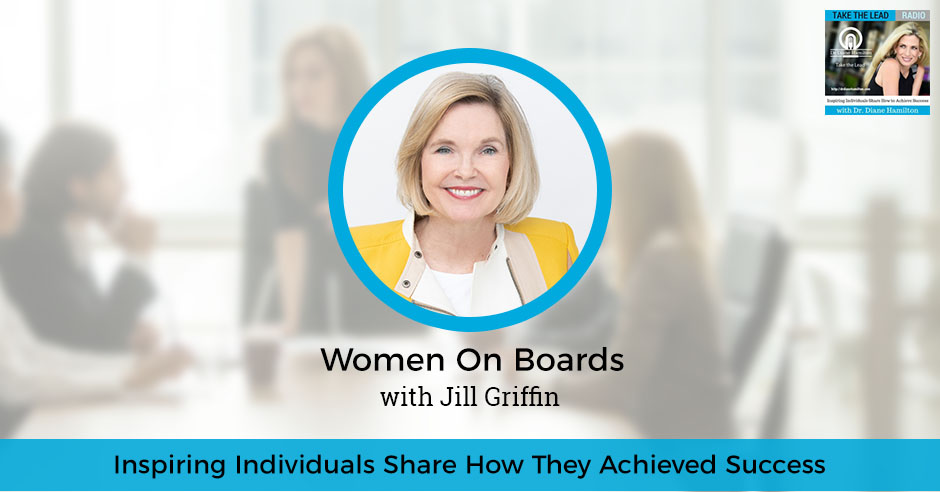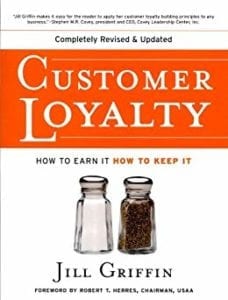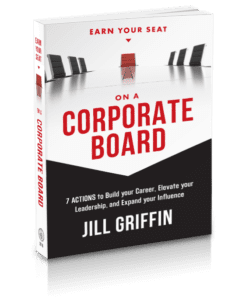Being a part of the Board of Directors can either bring a lot of frustration or be one of the greatest pleasures in life. In this episode, Diane Hamilton talks with Luby’s Fuddruckers’ Independent Board Director, Jill Griffin, about the work and life of being a Board of Directors. A champion of women and men who want to win, she passionate about helping them rise as leaders into senior management and onto corporate boards. Today, Jill talks about women on boards and shares what led to her interest in this direction, as well as the challenges and what it really takes to get a seat on the Board of Directors.

I’m so glad you joined us because we have Jill Griffin here. She is a Board Director, she’s a Harvard Working Knowledge author, a Fox contributor. She’s got some interesting work she’s done about how to get on board and I’m fascinated to talk to her.
Listen to the podcast here
Women On Boards With Jill Griffin
I am here with Jill Griffin who is a Board Director of Luby’s Fuddruckers. She’s a champion of women and men who want to win. It’s nice to have you here, Jill.
Thank you for having me on.
I was looking forward to this because I work on a lot of advisory boards. I know you deal a lot with Board of Directors and especially focus on how we’re having a bit of issue getting women on those boards. I’m interested to hear what led to your interest in this direction. Why don’t you give me a little background on you for people who don’t know?
I was able to obtain a seat on the Luby’s Fuddruckers board and it came about interestingly by writing a book. I wrote my first book in 1995 called Customer Loyalty: How to Earn It, How to Keep It. You’re saying, “What does that have to do with getting a board seat?” Here’s what happened. I wrote that book and I did some tiny little presentations around Texas. Evidently in one of those presentations, someone put a copy of the book on Red McCombs’s desk. Your readers might not know Red McCombs, but he at one time owned the Minnesota Vikings and the San Antonio Spurs.
He is an amazing businessman in the car business, but he certainly has modified into other industries. He gave $50 million to the University of Texas and the business school bears his name. As background, he called me after getting that book and said, “I had always known there was something wrong with these JD power satisfaction ratings, but I couldn’t put my finger on it. After reading the first chapter of your book I know it’s about loyalty, not satisfaction.” He read the book and the book earned it’s right to go in second edition. I went to see him and we’ve become friends. He introduced me to General Robert Herres at USAA who wrote me a wonderful introduction. USAA is a military insurer and they have the highest staff loyalty and customer loyalty ratings in the country. General Herres was retiring from USAA and he was on the Luby’s board. Luby’s was in trouble and that’s how I got that board seat.
That’s quite a story and it’s a great book. You’re well deserved to get attention for your work, but a lot of women don’t get that recognition sometimes. A lot of it is luck whether a man or a woman. It’s interesting to look at the power that women can have on boards or the fact that they’re looking at women at boards so much. I spoke at a women’s summit in Austin and there were other people there who were speaking about women on boards and they were talking about the California law that went into effect. I don’t know if you’re familiar with where it stands but I know people were not happy with it. Some people were fighting that. They want a certain number of women on boards by certain time frames. Do you have any background on that? Do you want to talk about that in general?
I have met the woman who did the legislation and Jerry Brown signed it at the last minute. I read that there are some firms certainly helping populate boards in California. There are some firms that are saying they will just pay the penalty which is $100,000 because they do not want the government telling them who can be on a board and who cannot. There is some bad blood there, but when people talked to me about it, I’ve had some male friends that didn’t like it one bit. I told them that when there’s a log jam, sometimes you have to dynamite out off it. That’s my point of view.
I’ve had men tell me they didn’t like it as well and $100,000 is not a lot of money.
It is not. That is probably one of the reasons that Brown was willing to write and endorse it.

It’s bringing attention and that part of it is good. I don’t think we have enough women out there on the board. A lot of what they want on boards are former CEOs and look at how many men are CEOs. You’re limiting who you’re putting on board by saying what your minimum qualifications are, aren’t you?
Yes, men CEOs are very much in demand but these men are busy. What they’ve done is drop down in some cases to C-Suite positions, chief customer officer, chief marketing officer, anything that’s got a title of chief in it also deems will for giving our board seat. In my book, I started studying how people got these seats and I described two buckets. Ones an evergreen bucket and it’s exactly what we were talking about. You have CEO in your title with yours. CFO, if you can share in all the committee, if you can sit on an audit committee. Those are evergreen skillsets that will always be in demand. There’s another bucket and it’s the expertise bucket, which I fell into in regards to my expertise in customer loyalty retention, employee loyalty. The good news is those skillsets are increasing because you’ve got cybersecurity and risk management. If you’re a small board, you might need a governance expert.
I’m hearing a lot more of cultural experts. If the problem is that they’re losing money due to engagement, soft skills, all of the things that fall into that category. If they have everybody on the board who can just read balance sheets, don’t they need to be more diverse?
Yes, and in fact I was reading an article where a guy at KPMG was found guilty. He’s going to have to go to prison for one year. Lynne Doughtie, their CEO said, “Soft skills are not soft skills, they are hard skills because the culture is what creates people telling the truth, being transparent, those kinds of things.” To your point, the culture is as important as anything these days.
My research is in emotional intelligence, curiosity and perception. That’s what I write about. Those are my research studies and that type of thing. When I talk about that especially with my research in curiosity, it all comes back to curiosity if you want to build innovation, if you want to build engagement, every single thing that they’re trying to work on in terms of that. When I look at corporate job descriptions for these boards of what they’re looking for, they’re always looking for CEO experience, all these years of that or financial background. I’ve yet to see a job description focused on that. Do you see it?
In regards to what, curiosity?
Not just curiosity but also having the cultural aspect of what they’re looking for on their board. They’re not looking for people who were more HR related. They’re looking for more financial related.
I have to be honest, I’m pushing for a candidate that has a high ranking HR experience that is the minority. As far as curiosity goes, I know that I am intently curious and that is one of the reasons I’ve written as many books as I have. What I’ve seen around the board table is deeply probing questions that get to the heart of why a number is what it is. I would argue, that has certainly got curiosity around it and it seems becoming from some of our newer board members.
I’ve seen a bit more with the board being more diverse. With my decade of sales, I know that they do want the sales perspective. They want certain things in a lot of these people. I just don’t think that a lot of people even recognize how to showcase themselves and I want to talk about that. You had mentioned something about the PG&E guy going to prison. I want to talk about some of the liability because a lot of people are turned off by worrying about being on boards if they aren’t financial experts. If something financial comes up, they’re held liable and then we realized that there’s an insurance that they offer. Can you talk about insurance of what they should be looking for?
[bctt tweet=”If you’re simply going for the money, there are better ways to earn than being on the board.” username=””]It is called D&O insurance, Deletion and Omissions insurance. I had a friend who was reading my book on the airplane and the guy sat next to her said, “Why would you even want to be on a board with all the liability associated with it?” A friend of mine’s son did his term paper, he was studying to be an attorney at North Western. He looked into it and said, “There was a snowball’s chance in hell that someone would get sued with all the liability around it.” For something as egregious as Enron, that’s another whole story. None of those people are ever able to serve on a corporate board again. I don’t think anybody on the board went to jail.
More people are worried about the financial liability than thinking that they’re going to jail.
The D&O insurance covers financial liability.
I was listening to Nancy May’s podcast about this. She and I both served on the Board of Advisors for DocuSign and she’s got an interesting podcast. They were talking about, if you left a board and the D&O was covering you while you were there, but then they canceled that and they went on some new policy. You’re not on it but you left, then you’re not covered because it went back in time. If somebody sued back in the time, that insurance is no longer there but you were there. I don’t know how it works exactly but it’s tricky. It’s something that people need a lawyer to look at. Are they always offering enough to cover you and how do you know if you’re covered if you leave?
We talked about that. We had certain divisions that come and report to us. When risk comes up, we’re always asking about that. The other thing that you do and I was advised to this is to have an ample personal liability policy over you. From what I know there’s a slim chance that you’d be sued while on the board. I will check with my risk officer next time I see him.
The reason I ask that is when I was in Texas, the woman who was talking about all the boards was saying, “All you need is one share of stock and if you’re not happy you can sue.” She gets sued all the time on the different boards from just little piddly things. I don’t know if that’s typical but they pay you to be on these boards. A lot of people are interested to know what they can expect payment wise if they were going to be on a board. I know it’s different if it’s a start–up versus a Fortune 100.
I would say micro boards which is what the Luby’s board is, the pay is around $100,000. As you get up, you’ve got micro cap, small cap, mid-cap and large cap. You got to almost be a celebrity to be on a large cap board. That’s paying up to maybe $500,000 or more. When you get to the mid-cap, it’s around $300,000 and the small cap is around $200,000.
You’re going to these meetings four times a year and you’re talking in between times.
If you’re going for simply the money, there are better ways to earn them. I’ve been on conference calls that were three hours or more. A lot of times, they schedule them for 3:00 in the afternoon. It’s certainly in the micro cap and small cap, there are better ways to earn money. Start-ups have not gone public yet. From what I understand they typically take their compensation in stock. Across all of these other boards, there’s a certain portion of it that has to be in stock because they want their board directors to have skin in the game.

When you start on a board, do they put you through training? Do they expect that you’ve had training in governance? How does that work?
Typically, they do put you in training. The board I joined was in such chaos when I got on the board. It was roll up your sleeves and jump right in. Typically, there is onboarding. It’s about six months, you’re on-site, you visit different departments of the company, you ask questions, that sort of thing.
You spend much more time the first year than the four times going out there then.
If I wanted to and I said, “I want a ride and go to some of these other restaurant locations. I want to ride with a regional manager and I want to see what’s going on,” I could easily do that.
It’s interesting to think about what it is that you do when you’re on a board. I know you’re talking about the ride alongs and things to visit and see what’s going on. Once you’re in the board like these quarterly meetings, what are you talking about? Is it all looking at financials? Is it all talking about turnovers? What is typical of what you are focusing on?
You as a potential board candidate should be testing your readiness. I have a list of questions that I have people go through when I’m coaching them on a board seat. It’s also in my book Earn Your Seat On A Corporate Board. Let me go through a couple of these. Number one is a deal-breaker from first question and it is, “Do you have the time to serve?” If you got a location problem, if you got a busy schedule, it may not be the right time to be on a board.
Do you say that people should serve only in their immediate location? What if you’re on the East Coast and you want to serve in California or vice versa?
You need to take that into consideration because that’s going to mean a day trip over. Usually, it’s coming a whole day before and a whole day to get back. If you’re a busy executive, that’s something you need to think about. I had someone that we were looking at for a board seat. She was already on another board. She had a lot of conflicts with the dates. Her dates were already taken when we would have our meetings.
They actually ran into that quite a bit though when they’re scheduling their meetings. Do they have to call everybody like, “Let’s try and get the most people here that we possibly can?”
[bctt tweet=”You as a potential board candidate should be testing your readiness.” username=””]It’s a deal-breaker if you can’t make the meetings right upfront.
Eventually, people probably miss one here and there.
If you go in knowing that you’ve got a lot of conflicts, you need to tell the person that’s vetting you and say, “My schedule is not going to work with this, I need to pass.”
Do they do them virtually or is it always in person?
They do them virtually and that certainly counts as attendance. It’s better face-to-face though. You never can replace that. You’re looking at body language and all that stuff.
I want to hear these questions. These are great. I’m interested.
One is, is compensation a secondary motive for you in seeking a board seat? There are a lot better easy ways. Are you well informed about a board of director’s liability? We’ve talked about that. Do you think like an entrepreneur? Are you financially literate? Are you a natural mentor? The deal is, management runs the company. Our job is to mentor management. Can you bring valuable context to the table? Austin is filled with technology companies and I came across a technology company that was a perfect fit for Luby’s at the time. They went to black based on the contract that Luby’s signed. Do you naturally bring humor to stressful situations? Being the researcher you are, do you like to dig deep for insight? Are you a team player? Are you naturally optimistic? Are you willing to speak up about sensitive topics? You have to and believe me, there have been many times that I say what I see and the men at the table are a little sourpuss about it but they get it.
That’s a big part of emotional intelligence and that’s what I study for my dissertation. It’s how you present information so that you know how it comes across to other people.
This one I love and this came from my friend Ralph Hasson. Can you cast the lone vote?

Be the one man on the jury who says the opposite, is that what you’re saying? To me, it’s all a question of logic, reasoning, taking the data and having critical analysis.
This is designed to gauge your bravery because you have to be a voice of one at times in order to get things done. I have definitely learned that.
How often have you had to be the voice of one?
On a conference call where we were forming a committee, there were all the guys on the committee. I spoke up and said, “We have got to have a female on this committee.” I did not nominate myself. I nominated the other highly respected woman on our board for that and they came to reason on it.
What you’re bringing up is something I’ve talked about when I spoke at SHRM about curiosity. There’s a research study out there where they followed this woman in a doctor’s office. They’ve surrounded her by all these people who were actors to see how she’d go along with status quo thinking. They would ring the bell every couple of minutes or so and the actors that she thought were patients would all stand and sit down for no reason. She watched them a few times and eventually she starts to stand up and sit down for no reason. It’s because going along with this status quo feels comfortable. Nobody wants to be the one who’s not doing what everybody else is doing. That’s what I’m trying to do with organizations is have them recognize how much they go along with status quo thinking. If everybody around you is saying yes to everything, that means you’re not encouraging curiosity and people aren’t asking questions. That’s a huge problem in the workplace. I imagine you see a lot of that on boards.
You have to police it. You have to use your value system and look at what’s going on. When you feel like it’s not filtering through your value system, you raise your hand.
I think people are afraid to do that though.
That’s why I say you’ve got to be a person that can step up to the plate and raise your hand and say, “This isn’t right.”
In the four things that I found inhibit curiosity, the first one is fear. That’s one of the reasons people do not speak up and do not ask questions. That’s what we need to work on so much in the workplace. It’s a huge thing.
[bctt tweet=”You have to be a voice of one at times in order to get things done.” username=””]Diane, you asked me what happens in a board meeting. I’ve got a sample agenda that I can talk through. In some days, you go full days. You can start at breakfast. In this particular agenda, it’s 8:00 AM but sometimes it could start as early as 7:00. What happens is from about 8:30 to 9:00, we have management reports. We have a CEO report, a COO report and a CFO report. The reason that time horizon is so short is because all of this is in read-ahead materials. It’s a matter of asking questions during that time. We then have the committee meetings and they go about three hours because that’s where a lot of the work gets done. In this particular agenda, it goes from 9:00 to 12:00. There are a lot of presentations of reports to a particular committee. I’ve chaired the P&A committee, it’s Personnel and Administration. In that are HR, risk, all human relations type of functions. We always have a working lunch and usually in that, in this case, the marketing update and the annual marketing plan gets presented. From 1:00 to 3:00 are the management reports. They look at capital expenditure, remodels, return on capital, structures, excess asset sales and debt. That’s a lot of what’s going on because we have a lot of properties.
I’m almost surprised they don’t start with money, numbers or early thinking.
When we have a report from the CEO, COO and CFO, there are a lot of money discussions going on there. We generally start with that. We go typically into a meeting where it’s simply the independent directors. That excludes our CEO who is an inside director. This is where a lot of the very candid thinking and discussion takes place. We go from there into 5:30 PM cocktails and dinner that doesn’t end usually 8:00 at night. It is a very long day. In this case, on day two, breakfast starts at 7:30. It’s usually two days and you’re exhausted by the time you wake.
I’ve been on so many board of advisor meetings. What’s interesting to me is the interactions of introverts versus extroverts in a meeting. A lot of introverts don’t get what they want to say because the extroverts monopolize the conversation. Have you found out that to be true?
We’ve got more extroverts on the board and more introverts in management.
If everybody is an extrovert on the board, are they all talking over one another?
I have a tendency to that sometimes. I will raise my hand, but pretty much the chairman of the board keeps it steady. He’ll say, “We can’t have side conversations going on. We’ve got to all be talking at the board table.” Side conversations start to happen sometimes then everything becomes chaotic. The chair is the person that has to pay attention and say, “Let’s all bring this discussion back to the table.”
I’m curious about the committees because you’re in these committees but it’s a two-day event. You must do the committees outside of this two-day event and then report on the committee action. When you meet, do you do it all over the phone? How do you do these meetings?
The committees meet during the board time and then they come back and report what has happened. Some of those committee matters can also be talked about again in the executive session. If there is something that happened that was sensitive, that can be reviewed again in executive session.

Your committee was interesting to me because that was right up my alley, personnel and administrative type of things. Is that a typical committee that you think boards have though? I haven’t heard of that necessarily always being in a committee.
I can’t speak to other boards but somebody’s got to be vetting HR, somebody’s got to be vetting operations.
What kind of test did you do on that committee like an example that you talked about?
When our HR head comes in, we look at diversity. We look at who’s being promoted. I always want to know how many women are being promoted through the ranks. Restaurant, and I’ll say this without candor, the hours are long and it is hard for women to want to do those jobs that take you late at night. I am always looking for ways to help make that happen. One of the things that I’m pleased about at Luby’s and Fuddruckers should that matter. We have a career path for every person in the restaurant, even the dishwasher.
I served on the Restaurant Alliance Board which I think it’s fascinating to look at the different types of board of advisors. It’s interesting to look at the different industries because I’m serving all these different industries from education, technology to restaurants. Was restaurant something that you’ve thought you would ever serve on or you just fell into it because of your story?
I was already a big loyal fan of Luby’s before I even got on that board. It was a natural fit from the standpoint that my area of specialty was customer loyalty and staff retention. It felt natural when I got offered the position.
I’d talked to a lawyer about what would be good companies to work on boards in terms of which ones are less risky, if you have people potentially suing and different things. He said that you want to probably steer away from banking and medical because there are more issues in that respect. Not that this is a concern of mine, but it was something that we’re talking about different risks. Do you agree that those are two risky ones to maybe consider?
Given what’s happened with Wells Fargo, who I still bank with because I love their online banking and their branches are close to me. The truth is based on what I know now, I’d be open and I would do a lot of vetting. Don’t get me wrong I do a lot of vetting, but I’d be open to almost any of these things because I have enough experience to know where to look for where the bodies might be buried. Honestly, when my former husband and I were looking at this, we went to someone that we had high respect for and she knew a lot about stocks and all of this.
She advised us against it because Luby’s at the time had some debt associated with it. My former husband wisely said, “You don’t get to be asked to be on the public board every day.” The Pappas Bros. who were renowned in Texas for their restaurants. They had Pappas Pizza and Pappadeaux. They’re a cash machine. They had just come on one year before taking a big stake in the company, infused a lot of cash. My former husband said, “I think the risk period is already over because they’re on board.” I went in with that as my guideline and I was delighted that I did. The woman that advised me came back to me later and said, “I gave you poor advice.” She’s a dear friend.
Don’t you want to have the challenge of bringing them back too? That’s how I look at it.
[bctt tweet=”Being a Board Director can bring you a lot of frustration or it can be one of the great pleasures in your life.” username=””]Me too. We’ve survived two fights. Those things we’re intense but then again you learn a lot about what happens when you are in a fight and how that is managed.
We’ve all heard people started not-for-profit to get experience. If you don’t want to start that way and you wanted to do what you did, get to a nice board of directors job. They’re not exactly advertised everywhere. I know there’s BoardProspects and certain websites out there that do a little bit of that. Usually, it’s word of mouth. How do you get people to know about you and how do you get these jobs?
First of all you’ve got to get visible. You’ve got to get out there. You’ve got to get active in your trade association for people to quickly get to know you and your expertise. In my book, I have laid out completely how you do this. There is a lot of networking involved but the truth is you’ve got to know where to network. In order to know where to network you need to know what board you are interested in serving on. The good news is so much of this is on the internet because you could go into annual reports. You can see what the retirement age is. You can see who’s getting ready to step down and what was their expertise. I ultimately had people list out ten boards that they think they would be well suited for. By virtue of that, then that tells you how to network and who knows who. LinkedIn is an amazing piece of software. If you’re looking for board ABC, put that in and see who knows who there. It is not impossible and certainly boards are by invitation only but there’s a lot you could do to fair it out what boards you’re interested in and who knows who.
You mentioned getting active in trade associations. I’m curious which trade associations are you part of and which ones stand out in line?
I’m verily involved in a trade association called National Association of Corporate Directors. There are people in that organization that are not on board, but they’re there to rub elbows with people that are on boards. I found the Austin Chapter. In Texas, there’s a Tri-Cities chapter. It’s Houston, Austin and San Antonino. Dallas has its own chapter but that’s been a fun place to be because they do a lot of education about liability, startup boards, a lot of those kinds of things. I would highly recommend your readers, whatever state they’re in, check out National Association of Corporate Directors because every state has a chapter.
When you do that, do they have meetings that you attend or do you do webinars?
They have meetings you attend. They certainly put on webinars. There’s a lot that you can learn and there’s a resume registry that’s part of NACD. I’m a little suspect on resume registries because you’re up there with everybody else. I believe you blaze your way to a board seat and some of it is personal branding and that’s extremely important. I signed up for a seminar that is sponsored by one of the companies here in town. They had grown in people that are board recruiters at some of these large law firms. They are teaching personal branding, your mission statement, and what your resume needs to look like.
How do you find these board recruiters and people who are trying to get on their radar?
I got contacted by a board recruiter and we had breakfast together. He reached out to me, but again go to LinkedIn and type in “board recruiters” and see what comes up.

There’s so much out there. LinkedIn is huge and for those of us who have used it a lot, you’ve got some great connections and it’s important. I know you talked about this in Austin. When I was at that Austin event, it was interesting to talk to some of those women who were there to talk about the boards and behind the scenes information. I was looking forward to having you talk about this because there’s a lot of attention on women on boards, and boards in general and how it’s changed. Not anywhere near that talked about liability before all the Enron and things that are going on. A lot of people are looking at some of that. Anything that people could learn from your book is important. It’s called Earn Your Seat On a Corporate Board: 7 Actions to Build your Career, Elevate your Leadership, and Expand your Influence. In case people would like to get a copy of that or just find you, is there a link or something that you would like to share?
My website is JillGriffin.net and all of my books are on the Amazon. If you look at the reviews on this board book, I’m proud of them. One guy gave it to his wife for her birthday and she was very pleased with it. I read another one that said, “I don’t want to bad mouth board books.” He says, “This is the one that I went through and you’ll see that I had all kinds of highlights and notes to the margin. That’s when I know that I get a book.”
The things you’ve shared alone were amazingly helpful to anybody who is thinking about doing this. It was interesting to me because this is also something I’ve been looking into as well. I found a lot of interest from hearing all you talk and all the women in the Austin event. It’s great to see that there is a lot of helpful advice out there. Thank you for being on the show, Jill. This is fun.
I’ve gotten to do such amazing, fun things in my career but this has been the pinnacle experience. The reason is you get to see a company from the top, how it operates, you get elbow-to-elbow with smart people and I’m always learning. Those are the two things that I would say and I would not shy away simply because of being afraid you’re going to be sued. There are easy ways around that.
A lot of people are more worried about their lack of abilities to deal with balance sheets and reading financial records.
You have to sign a statement that you are financially literate and know how to do that. They made that rule after Enron. The truth of the matter is it doesn’t stop anyone from going to community college to and take an accounting course. That’s the easy way to solve that problem.
A lot of us could always use refresher information. I know they do a lot of training and they do all that when you sign up on these boards. This has been helpful. Thank you so much, Jill. I enjoyed our conversation.
I did too and I loved hearing what you do. I like to talk more offline at some point.
We will do that.
—
I’d like to thank Jill for being my guest. We get so many great guests on this show. If you’ve missed any past episodes, you can go to DrDianeHamilton.com. If you go to the top, you can go check out the show. We’re all on different stations iHeart, iTunes, you name it, we’re out there. As far as on the website you can also find out more information about Cracking The Curiosity Code book and the Curiosity Code Index. Its all at the top. I hope you take some time to check out the site and I hope you join us for the next episode of Take The Lead Radio.
Important Links:
- Jill Griffin
- Luby’s Fuddruckers
- Customer Loyalty: How to Earn It, How to Keep it
- USAA
- Earn Your Seat On a Corporate Board: 7 Actions to Build your Career, Elevate your Leadership, and Expand your Influence
- JillGriffin.net
- Harvard Working Knowledge
- DocuSign
- BoardProspects
- National Association of Corporate Directors
- iHeart – Take The Lead
- iTunes – Take The Lead
- Cracking The Curiosity Code
- Curiosity Code Index
About Jill Griffin
 Jill Griffin is a Board Director of Luby’s Fuddruckers, a Harvard “Working Knowledge” Author; Fox News Contributor. She is a champion of women and men who want to win.
Jill Griffin is a Board Director of Luby’s Fuddruckers, a Harvard “Working Knowledge” Author; Fox News Contributor. She is a champion of women and men who want to win.
She is the author of Earn Your Sear on a Corporate Board: 7 Actions to Build Your Career, Elevate Your Leadership, and Expand Your Influence.
Love the show? Subscribe, rate, review, and share!